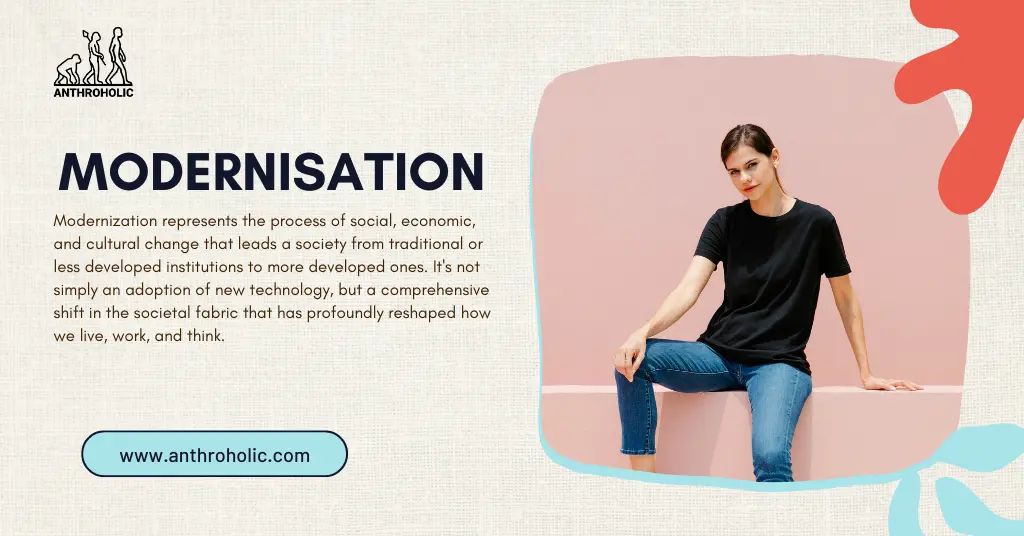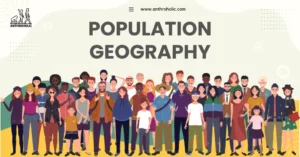AI Answer Evaluation Platform Live Now. Try Free Answer Evaluation Now
Modernization
Modernization represents the process of social, economic, and cultural change that leads a society from traditional or less developed institutions to more developed ones. It’s not simply an adoption of new technology, but a comprehensive shift in the societal fabric that has profoundly reshaped how we live, work, and think.

Understanding the Concept
Modernization typically involves:
- Technological Advancements: This is the most observable aspect of modernization. From the industrial revolution’s steam engines to today’s quantum computing and AI technology, each technological leap pushes society towards further modernization.
- Urbanization: The shift from rural to urban living is a key element of modernization. Urbanization leads to increased access to services, diverse opportunities, and a concentration of human resources.
- Education: Modernization leads to increased emphasis on education. It empowers people, promoting critical thinking, innovation, and adaptability.
- Secularization: As societies modernize, there’s often a decreased influence of religion on societal and governmental institutions, shifting towards secularism.
- Bureaucratization: Modern societies lean towards formal organizational structures. Bureaucratization standardizes processes, enhancing efficiency and predictability.
Impact of Modernization
Modernization profoundly influences various aspects of society:
- Economic Impact: Modern societies typically exhibit strong economic growth. Technological innovation drives productivity, while urbanization creates hubs of economic activity.
- Social Impact: Modernization can both unite and divide. On one hand, it brings people closer through communication technology. On the other hand, it may lead to social inequality and create a generational gap.
- Political Impact: Modernization often leads to democratic governance. The increased emphasis on education, access to information, and urban living can foster political awareness and participation.
- Cultural Impact: Modern societies experience cultural transformation. They embrace diversity and become more accepting of different cultural backgrounds, but may also risk losing traditional cultural identities.
Modernization Theory
Developed in the mid-20th century, the Modernization Theory provides a linear model for societal development, suggesting that all societies pass through the same stages of growth:
- Traditional Stage: Characterized by subsistence farming or hunting, with limited technology.
- Take-off Stage: Industrialization begins, society starts investing in infrastructure and education.
- Drive to Technological Maturity: Continued industrialization, increased urbanization, and a shift to a service-based economy.
- High Mass Consumption Stage: High levels of wealth and high consumption, advanced technology and a strong service sector.
However, this theory has its limitations. It suggests a linear progression, which doesn’t account for unique cultural, historical, and geopolitical factors influencing each society’s path.
Criticisms of Modernization
Modernization isn’t without its criticisms:
- Environmental Impact: Modernization, especially industrialization, often leads to environmental degradation, contributing to climate change.
- Cultural Erosion: Rapid modernization can lead to the loss of cultural heritage as societies move away from traditional customs and practices.
- Inequality: Modernization can exacerbate socioeconomic inequality. Those who cannot keep up with the rapid pace are often left behind.
- Mental Health: The fast-paced, high-stress lifestyle of modern societies can contribute to mental health issues.
The Future of Modernization
Despite criticisms, modernization continues to shape our world. The future will likely bring further technological advancements, shifting societal structures, and changing cultural landscapes. However, it’s crucial to address the negative impacts and create inclusive, sustainable societies that not just survive, but thrive in this modern world.
Strategies for Responsible Modernization
As we push the boundaries of modernization further, it becomes crucial to adopt responsible strategies to mitigate the downsides:
- Sustainable Development: This refers to progress that meets present needs without compromising future generations’ ability to meet theirs. Incorporating sustainable practices in modernization ensures environmental protection alongside economic growth.
- Inclusive Growth: Inclusivity must be at the core of modernization. This means ensuring that the benefits of modernization reach all segments of society, reducing the risk of creating economic or social inequalities.
- Preservation of Cultural Heritage: Rapid modernization can threaten traditional cultures and values. It is essential to consciously preserve and promote cultural heritage while accepting new ideas and practices.
- Mental Health Awareness: The stressful lifestyle associated with modernization can impact mental health. Promoting mental health awareness and care should be an integral part of modernization.
Case Studies
Understanding the impacts of modernization and the strategies to mitigate its challenges can be better grasped through case studies:
- Japan: After the Meiji Restoration in 1868, Japan undertook rapid modernization, transforming from a feudal society to a modern industrial state. The Japanese managed to blend Western influences with their traditional culture, demonstrating that modernization need not erase cultural heritage.
- United Arab Emirates: Within a few decades, the UAE transformed from a desert land to a global hub. However, this rapid modernization brought challenges like environmental issues and cultural erosion. Today, the UAE is striving for sustainable and culturally conscious development.
Modernization and Globalization
In the modern world, globalization and modernization often go hand in hand. Globalization has accelerated modernization by facilitating the exchange of ideas, practices, and technologies across borders. However, this also means that the challenges of modernization—like inequality, cultural erosion, and environmental degradation—also become global issues.
Conclusion
Modernization, with all its complexities and paradoxes, remains an undeniable force shaping our world. It drives societies forward, creating wealth, knowledge, and opportunities. However, the path to modernization also presents significant challenges. Balancing the need for progress with the importance of equity, cultural preservation, and environmental sustainability is a delicate task. By understanding the intricate dynamics of modernization, we can aim to guide this transformative process towards creating a better, more inclusive, and sustainable world for all.




